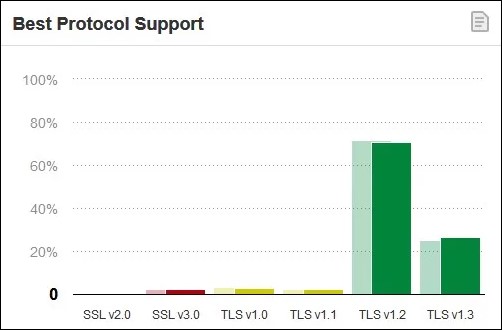
Microsoft announced today that it will delay disabling support for the insecure Transport Layer Security (TLS) 1.0 and 1.1 protocols from Microsoft web browsers because of the current global situation until the second half of 2020, with an estimated time of roll out during July.
"For the new Microsoft Edge (based on Chromium), TLS 1.0 and 1.1 are currently planned to be disabled by default no sooner than Microsoft Edge version 84 (currently planned for July 2020)," Kyle Pflug, Microsoft Edge Developer Experience Principal PM Lead, said.
"For all supported versions of Internet Explorer 11 and Microsoft Edge Legacy (EdgeHTML-based), TLS 1.0 and TLS 1.1 will be disabled by default as of September 8, 2020."
Although users will still be able to toggle TLS 1.0 and TLS 1.1 back on even after they will be disabled, Microsoft recommends transitioning from insecure protocols as newer TLS versions come with more modern cryptography and are also broadly supported by modern browsers.
TLS 1.0 and TLS 1.1 will soon be disabled by default in all supported Microsoft browsers, starting with Microsoft Edge version 84.
— Microsoft Edge Dev (@MSEdgeDev) March 31, 2020
Learn more on the Microsoft Edge blog: https://t.co/GDvAGofuGK
TLS retiring plans
Earlier this month, Mozilla said that the support for insecure TLS will be re-enabled in the latest version of Firefox to maintain access to government sites with COVID19 information that haven't yet upgraded to newer TLS versions.
This happened after TLS 1.0 and TLS 1.1 support was dropped with the release of Firefox 74.0 on March 10 to improve the security of website connections.
The retirement of these insecure protocols from the list of supported protocols was announced by all major browser makers including Microsoft, Google, Apple, and Mozilla back in October 2018.
Microsoft said at the time that these outdated protocols will be disabled sometime during the first half of this year in the company's web browsers.
With over 97% of the sites surveyed by Qualys SSL Labs featuring TLS 1.2 or TLS 1.3 support, the vendors' decision to disable the two protocols in favor of newer and better-supported ones is logical as they can provide a more secure path going forward.

Per usage statistics shared by Microsoft, Google, Apple, and Mozilla when the retirement of TLS 1.0 and TLS 1.1 was announced, the vast majority of their users no longer use these protocols:
- Microsoft said that only 0.72% of secure connections made by Edge use TLS 1.0 or 1.1.
- Google reported that only 0.5% of HTTPS connections made by Chrome are using TLS 1.0 or TLS 1.1
- Apple reported that on their platforms less than 0.36% of HTTPS connections made by Safari are using TLS 1.0 or TLS 1.1.
- Firefox had the largest amount of connections, with 1.2% of all connections using TLS 1.0 or 1.1.
Netcraft also reported at the beginning of March that the insecure TLS 1.0 and TLS 1.1 protocols are still in use on more than 850,000 websites, exposing users to a large array of cryptographic attacks (1, 2) that could lead to their web traffic being decrypted by threat actors.
"The use of TLS 1.0 on e-commerce websites as a measure for protecting user data has been forbidden by the Payment Card Industry Data Security Standard since June 2018, and many websites have already migrated," as Netcraft explained.



Post a Comment Community Rules
You need to login in order to post a comment
Not a member yet? Register Now